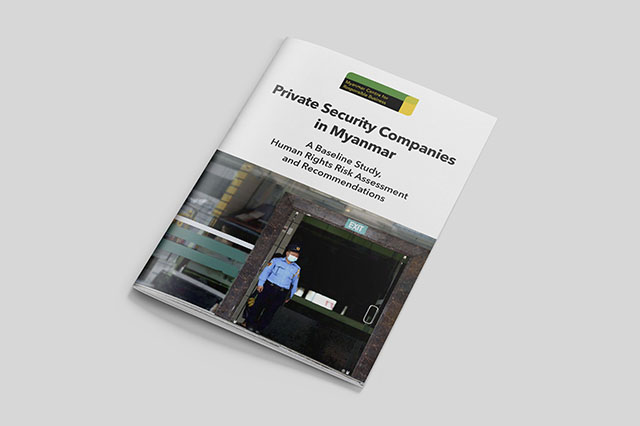A year after the coup, Myanmar Centre for Responsible Business continues to do what it can to support businesses to operate responsibly in Myanmar. Our aim is to protect the gains and reforms achieved over the previous decade, so that a responsible private sector can continue to have a positive impact on the lives of the people of Myanmar.
In the last year, we have guided businesses individually and collectively on what heightened human rights due diligence means, particularly for the safety of workers, customers and other stakeholders. This week, we have published the first ever study of the private security company (PSC) sector in Myanmar and the human rights risks which companies need to manage.
This was undertaken at the request of the Myanmar in-country working group (ICWG) of the Voluntary Principles on Security and Human Rights (VPSHR), for which MCRB has provided a secretariat for since 2018. The recent announcements made by VPSHR members Total, Chevron, and Woodside that they are withdrawing from Myanmar led to the winding up of the ICWG at its last meeting on 9 February. However MCRB will continue to work on business, security and human rights with a wider range of companies in Myanmar, beyond extractives as well as with civil society stakeholders. This includes not only PSCs, but also their clients and sectors such as manufacturing, shopping centres and banking.
The PSC report incorporates many recommendations to companies on how to ensure their security arrangements respect human rights, including the first guidance in Myanmar on responsible use of closed-circuit TV (CCTV). This draws on MCRB’s work since 2014 on how businesses should respect the right to privacy, an issue at the heart of the debate on a draft cybersecurity law. MCRB has compiled the analysis and commentary by business and NGOs on the January 2022 draft cybersecurity law, and will track this as closely as we can.
The lack of a rights-protecting legal framework for telecommunications, which we identified in our 2015 Sector-Wide Impact Assessment underlies Telenor’s decision to exit Myanmar. Each company that decides to leave does so based on its particular circumstances, which may be commercial, operational, legal, or as a consequence of stakeholder pressure. Those that opt to exit should do so responsibly: our co-founder, the Institute for Human Rights and Business (IHRB) recently blogged on what that means. Responsible Disengagement was the subject of a recent webinar with the OECD and Eurocham.
Similarly, companies – whether Myanmar or foreign - that continue to operate should do so responsibly. They should undertake continuous, heightened due diligence, taking into account the conflict which affects all of Myanmar, including its urban areas. On Monday 21 February, MCRB and Eurocham will host a webinar on what this means in the garment sector (register here), in the margins of the OECD Forum on Due Diligence in the Garment and Footwear Sector. MCRB also contributed to the recent Eurocham Garment Sector Factsheet, and to data on Myanmar in the Open Apparel Registry. We are connecting garment brands and labour rights groups working in Myanmar to support better conditions in the sector and remedy of specific abuses.
